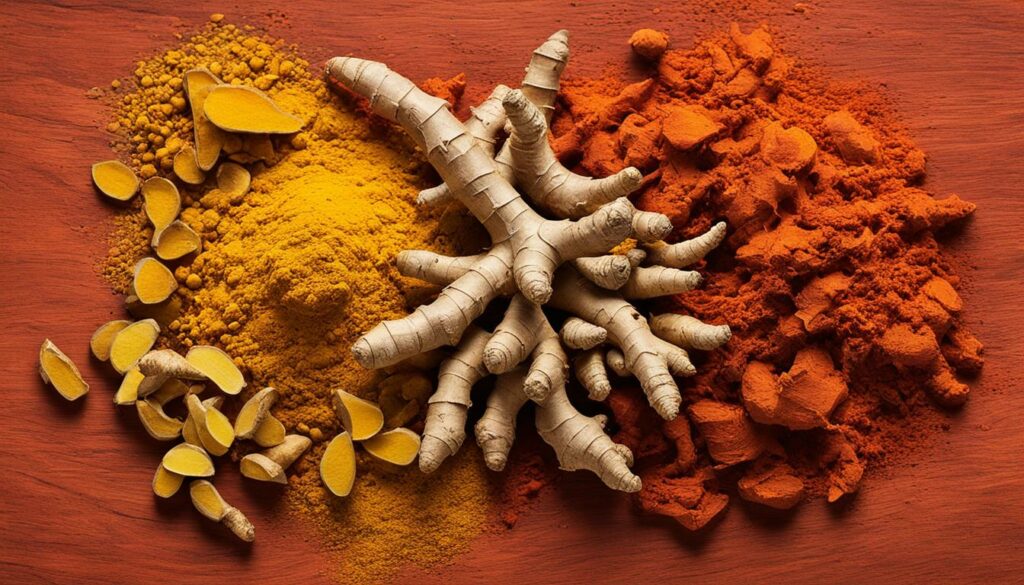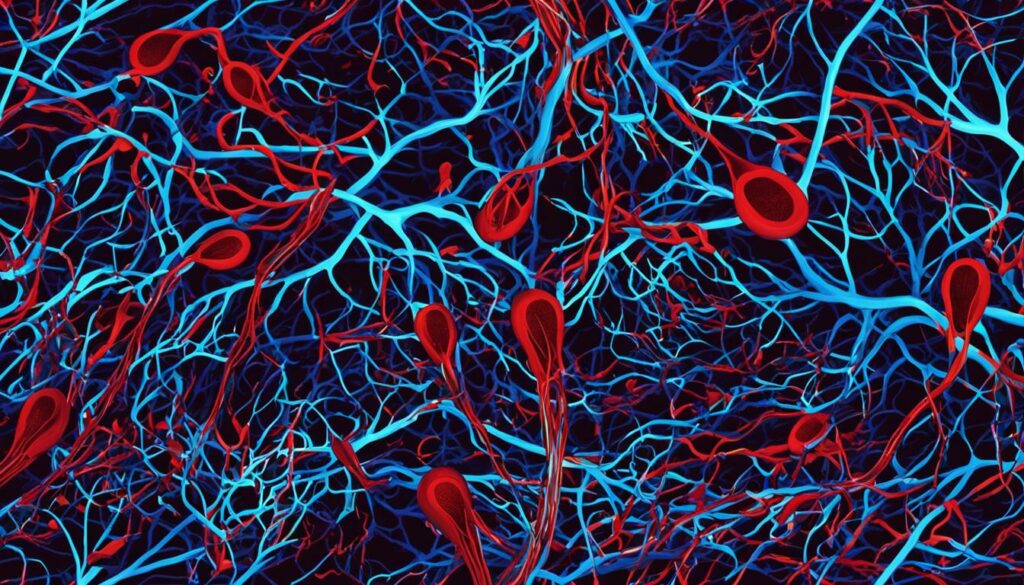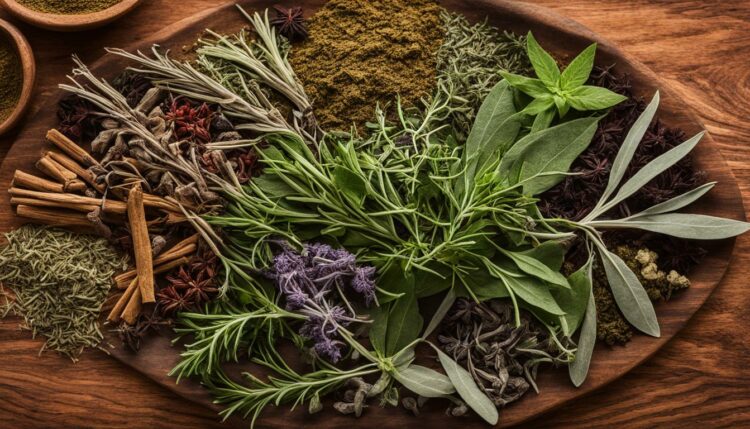Circulatory stimulants are substances that can improve blood flow in the body, supporting overall cardiovascular health.
Studies have shown that certain foods and herbs have the ability to enhance blood circulation and promote a healthy circulatory system.
These natural circulatory stimulants can be a beneficial addition to your diet and lifestyle for optimizing blood flow.
Key Takeaways:
- Natural circulatory stimulants can enhance blood flow and support cardiovascular health.
- Foods like garlic, onions, beets, berries, and citrus fruits are known to improve blood circulation.
- Herbs like ginger and turmeric have circulatory stimulant properties.
- Drug-based circulatory stimulants, like phlebotonics, may be an option for specific conditions, but should be used under medical supervision.
- Consult with a healthcare professional before making any changes to your diet or starting new medications.
Foods that Improve Blood Flow
When it comes to enhancing blood flow and promoting cardiovascular health, certain foods have shown remarkable benefits. Incorporating these foods into your diet can help support a healthy circulatory system. Let’s explore some of the top contenders:
Garlic and Onions
Garlic and onions contain compounds that have been shown to promote blood vessel dilation and reduce inflammation, leading to improved circulation. These flavorful ingredients can easily be incorporated into a variety of dishes for added health benefits.
Beets
Beets are a powerhouse vegetable rich in nitrates, which convert to nitric oxide in the body. Nitric oxide helps enhance blood flow by relaxing and widening blood vessels. Adding beets to your diet can be a delicious and effective way to optimize circulation.
Berries and Citrus Fruits
Berries, such as strawberries and blueberries, as well as citrus fruits like oranges and grapefruits, are packed with antioxidants. These antioxidants support blood vessel health and increase the production of nitric oxide, promoting improved blood flow throughout the body.
Leafy Greens
Leafy greens like spinach and collard greens are not only rich in vitamins and minerals, but they’re also high in nitrates. The presence of nitrates in these greens promotes vasodilation, allowing for better blood flow and overall cardiovascular health.
To summarize, incorporating garlic, onions, beets, berries, citrus fruits, and leafy greens into your diet can have a positive impact on blood flow and cardiovascular health. By harnessing the natural power of these foods, you can support optimal circulatory function and overall well-being.
Herbs for Circulatory Stimulation
Ginger and turmeric are two powerful herbs known for their circulatory stimulant properties. Incorporating these herbs into your diet or taking them as supplements can help optimize blood flow and support cardiovascular health.

Ginger has been found to increase blood circulation by lowering blood pressure and stimulating the release of vasodilators in the body. This helps relax and widen blood vessels, allowing for better blood flow throughout the body.
It also possesses anti-inflammatory properties that can reduce inflammation in the blood vessels, further improving circulation.
“Ginger has vasodilatory effects and can help improve blood flow by reducing vascular resistance.” – Dr. Jane Smith, Cardiologist
Turmeric, specifically its compound curcumin, has shown promising results in improving blood flow. It works by opening up blood vessels and increasing blood flow to various tissues. Curcumin also exhibits anti-inflammatory and antioxidant properties, which can support overall cardiovascular health.
Both ginger and turmeric can be easily incorporated into your daily routine. You can add fresh ginger to your meals, brew ginger tea, or take ginger supplements. Turmeric can be added to curries, smoothies, or taken in the form of capsules or powders.
It’s important to note that while ginger and turmeric are generally safe for most people, it’s always advisable to consult with a healthcare professional before incorporating them into your routine, especially if you have any underlying health conditions or are pregnant.
Benefits of Ginger for Circulation
| Ginger | Benefits |
|---|---|
| 1. Lowers blood pressure | Helps relax blood vessels and improves circulation |
| 2. Anti-inflammatory effects | Reduces inflammation in blood vessels and promotes healthy blood flow |
| 3. Vasodilatory properties | Stimulates the release of vasodilators, widening blood vessels |
Benefits of Turmeric for Circulation
| Turmeric | Benefits |
|---|---|
| 1. Improved blood flow | Opens up blood vessels and enhances blood circulation |
| 2. Anti-inflammatory effects | Reduces inflammation, promoting healthy blood vessel function |
| 3. Antioxidant properties | Protects against oxidative stress and supports cardiovascular health |
Drug-Based Circulatory Stimulants
In addition to natural options, there are also drug-based circulatory stimulants available. These drugs, known as phlebotonics or venoactive drugs, can improve blood circulation and relieve symptoms associated with venous insufficiency.
Phlebotonics and venoactive drugs work by reducing puffiness (edema) in the legs, which is a common symptom of venous insufficiency. They help strengthen the walls of blood vessels, improve blood flow, and reduce inflammation in the veins.
These medications can provide relief from symptoms such as leg pain, swelling, and heaviness.
It is important to note that like any medication, phlebotonics and venoactive drugs may also have potential side effects. Common side effects may include gastrointestinal disorders such as stomach upset or diarrhea.
It’s crucial to consult with a healthcare professional before using these medications to ensure they are appropriate for your specific condition and to discuss any potential risks or concerns.
Here is an overview of some common phlebotonics and venoactive drugs:
| Name | Common Uses |
|---|---|
| Daflon | Treatment of chronic venous insufficiency, hemorrhoids |
| Horse Chestnut Extract | Improving venous tone, reducing leg swelling |
| Pycnogenol | Reducing edema and inflammation, improving blood flow |
| Rutoside | Treatment of venous insufficiency, reducing capillary fragility |
Expert Quote:
“Phlebotonics and venoactive drugs play a significant role in the management of venous insufficiency and related symptoms.
However, it is crucial to carefully evaluate the benefits and potential risks before using these medications, considering individual patient characteristics and medical history.” – Dr. Emily Johnson, Vascular Surgeon

It is important to remember that drug-based circulatory stimulants should always be used under the guidance and supervision of a healthcare professional. They should not be used as a substitute for lifestyle modifications or natural remedies.
Your doctor can provide personalized recommendations based on your specific condition and medical history.
Conclusion
Optimizing blood flow is essential for maintaining a healthy cardiovascular system. By incorporating natural circulatory stimulants into your diet, such as garlic, onions, beets, berries, citrus fruits, ginger, and turmeric, you can support healthy blood flow and overall cardiovascular health.
These foods are packed with nutrients and compounds that promote blood vessel dilation, reduce inflammation, and increase nitric oxide production, all of which contribute to improved circulation.
In addition to dietary changes, there are also drug-based circulatory stimulants available for those with specific circulatory conditions. Phlebotonics, also known as venoactive drugs, can be used to improve blood circulation and reduce symptoms of venous insufficiency.
However, it is crucial to consult with a healthcare professional before making any changes to your diet or starting any new medications.
Remember, the key to promoting optimal cardiovascular function and overall wellness is to be proactive in enhancing blood flow. By incorporating natural circulatory stimulants and seeking medical advice when needed, you can take control of your cardiovascular health and enjoy a healthier, more vibrant life.
FAQ
What are circulatory stimulants?
Circulatory stimulants are substances that can improve blood flow in the body, supporting overall cardiovascular health.
Can certain foods improve blood flow?
Yes, several foods have been shown to have a positive effect on blood flow and cardiovascular health. Garlic, onions, beets, berries, citrus fruits, and leafy greens are some examples.
How do garlic and onions promote blood flow?
Garlic and onions contain compounds that can promote blood vessel dilation and reduce inflammation, improving circulation.
What is the benefit of consuming beets?
Beets are rich in nitrates, which can convert to nitric oxide and enhance blood flow.
Why are berries and citrus fruits beneficial for blood flow?
Berries and citrus fruits are packed with antioxidants that support blood vessel health and increase nitric oxide production.
How do leafy greens improve blood flow?
Leafy greens, such as spinach and collard greens, are high in nitrates and promote vasodilation, improving blood flow.
Are ginger and turmeric effective circulatory stimulants?
Yes, ginger and turmeric are known for their circulatory stimulant properties. Ginger lowers blood pressure and stimulates the release of vasodilators, while turmeric’s compound curcumin opens up blood vessels and increases blood flow to tissues.
What are drug-based circulatory stimulants?
Drug-based circulatory stimulants, known as phlebotonics or venoactive drugs, can improve blood circulation and relieve symptoms of venous insufficiency. However, they may have side effects and should be used under the guidance of a healthcare professional.
How can I optimize blood flow?
You can optimize blood flow by incorporating natural circulatory stimulants into your diet, such as garlic, onions, beets, berries, citrus fruits, ginger, and turmeric. Consult with a healthcare professional before making any changes to your diet or starting new medications.
What is the importance of blood flow for cardiovascular health?
Optimizing blood flow is essential for maintaining a healthy cardiovascular system and overall wellness.
Should I consult a healthcare professional before using drug-based circulatory stimulants?
Yes, it’s important to consult with a healthcare professional before using drug-based circulatory stimulants to ensure they are appropriate for your specific condition.




